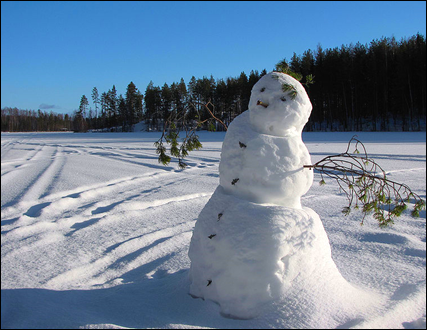This poem will turn your mind inside-out! Maybe I felt that way because I was listening to this poem amid a bunch of Wallace Stevens’ other poems. They’re very unique.
Older kids and adults will enjoy The Snow Man more than younger kids. You might have to read the poem a couple of times to get it and it’s easier to understand when you hear it recited, like in the mp3 recording below.
The Snow Man
by Wallace StevensOne must have a mind of winter
To regard the frost and the boughs
Of the pine-trees crusted with snow;And have been cold a long time
To behold the junipers shagged with ice,
The spruces rough in the distant glitterOf the January sun; and not to think
Of any misery in the sound of the wind,
In the sound of a few leaves,Which is the sound of the land
Full of the same wind
That is blowing in the same bare placeFor the listener, who listens in the snow,
And, nothing himself, beholds
Nothing that is not there and the nothing that is.
Enjoy!
Mama Lisa
Note 1: Read my very quick take on this poem in the comments below.
Note 2: There’s an interesting article with a short podcast about this poem called Wallace Stevens: ‘The Snow Man’ by Jay Keyser on NPR.
Photo: By Wikimedia Commons user Petritap (edited by Mama Lisa)
This article was posted on Friday, January 7th, 2011 at 5:34 pm and is filed under English, Languages, Mama Lisa, Poems, Poems about Life, Poems about Snow, Poetry, Poetry about the Seasons, Poetry about the Weather, Poets, Seasonal, Snow, Snowman, Wallace Stevens, Weather, Winter. You can follow any responses to this entry through the RSS 2.0 feed. You can skip to the end and leave a response. Pinging is currently not allowed.
One Response to “The Snow Man by Wallace Stevens”
Leave a Reply


























January 7th, 2011 at 5:51 pm
The trick to the poem is that it’s from the point of view of the Snowman (an inanimate object as opposed to the normal point of view of a human).
It’s like the idea if a tree falls in the forest and no one’s there to hear it, did it make a sound? In this case, is it really cold out if we’re not there to perceive it? There’s not misery in the sound of the (cold) wind if we’re not there to make the judgment that it’s miserable.